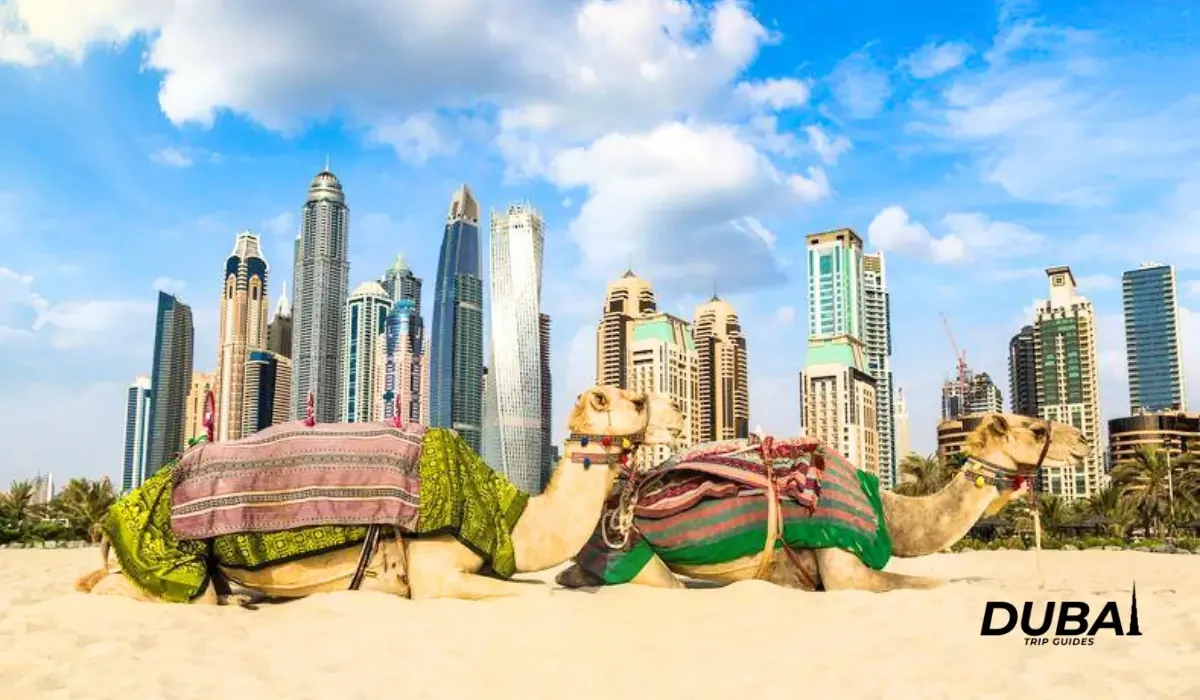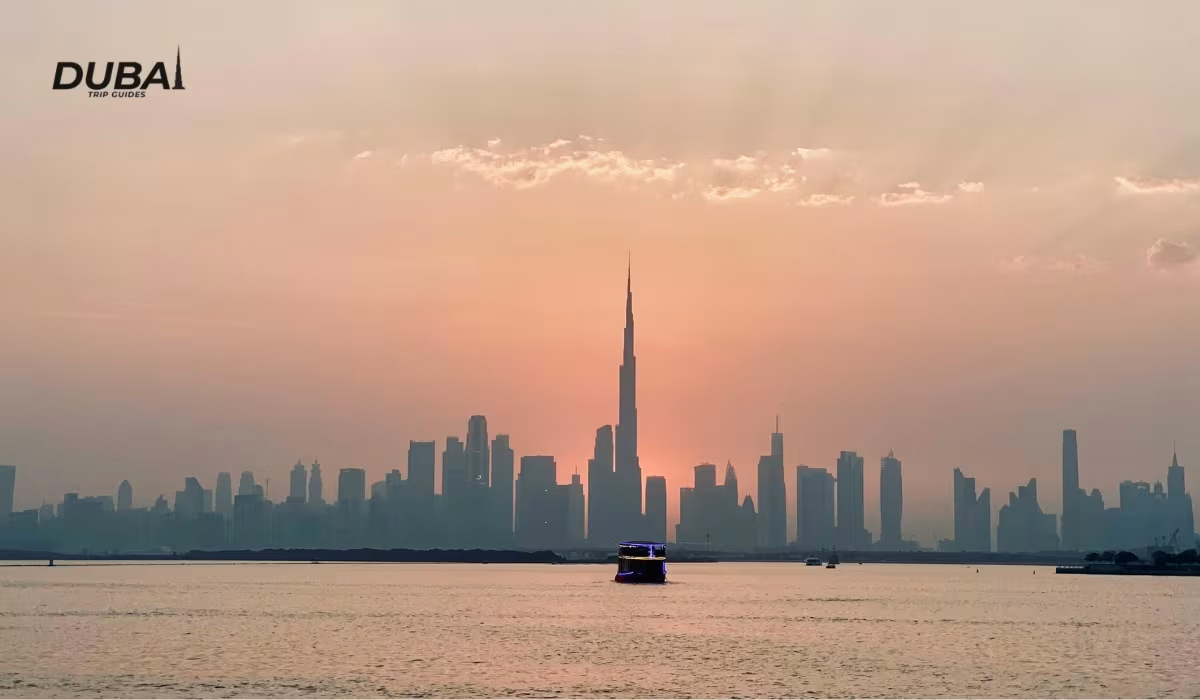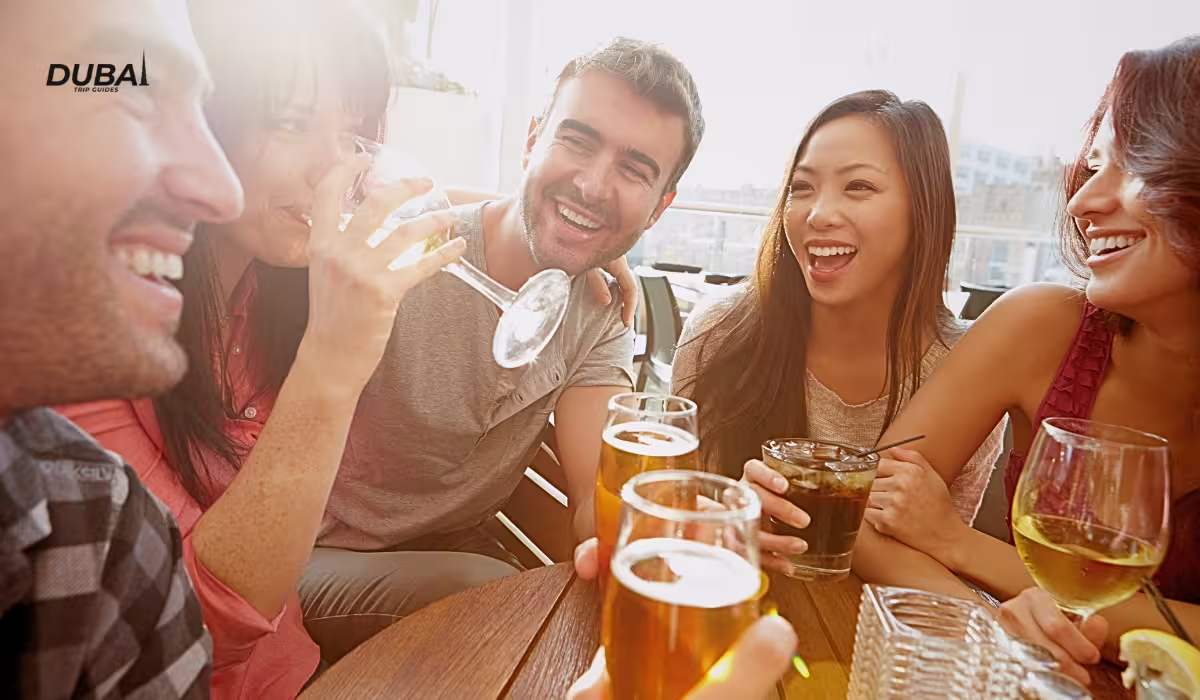Dubai’s rich heritage is a mix of old Emirati culture and new world influences. It sits between the desert and the sea. This city has changed a lot over time.
Keeping Dubai’s heritage alive is key to its unique identity. Even as it gets modern, it stays true to its roots.
Learning about Dubai culture and traditions helps us understand today’s ways and customs.
The Historical Foundations of Dubai
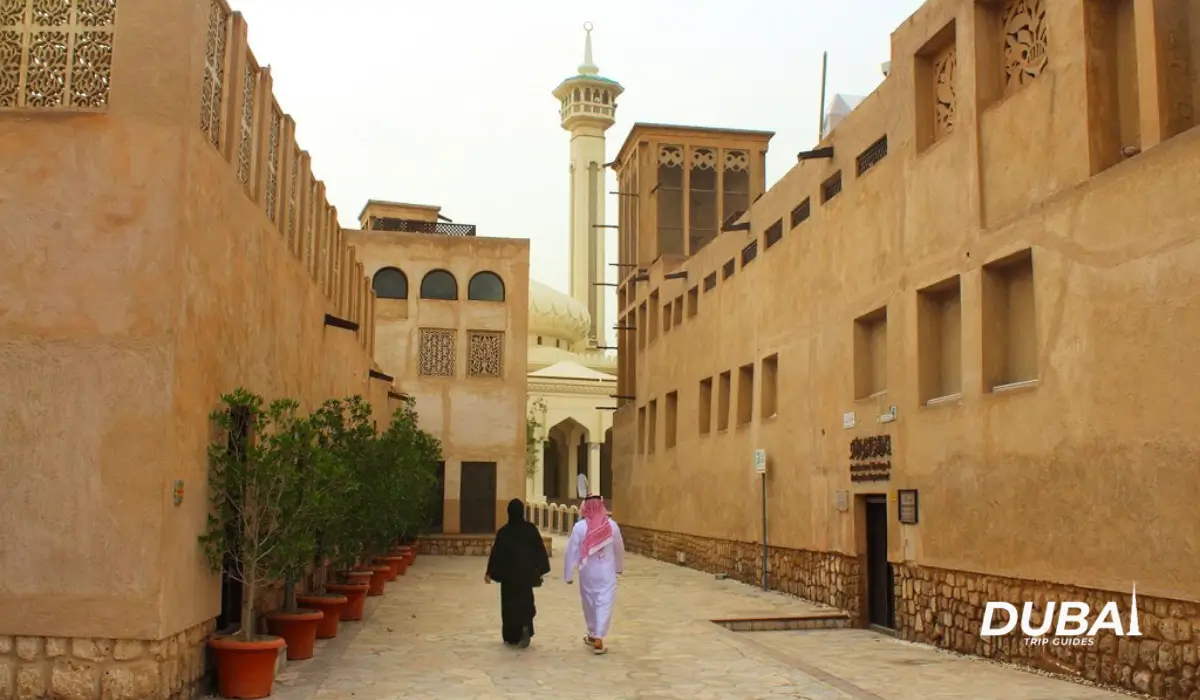
Dubai’s rich culture comes from its Bedouin traditions and great location. It has grown from a small fishing village to a global city. This shows the people’s strength and ability to change.
From Fishing Village to Global Metropolis
In the early 1900s, Dubai was a small fishing and pearling village. The discovery of oil in the late 1960s changed everything. It made Dubai grow fast.
As Dubai’s economy grew, so did its buildings. Leaders like Sheikh Rashid bin Saeed Al Maktoum helped modernize the city.
The city’s growth also brought cultural and social changes. People from all over the world came, making Dubai diverse. Now, Dubai is famous for its architectural marvels, culture, and business opportunities.
Bedouin Heritage and Tribal Roots
The Bedouin heritage is key to Dubai’s culture. Bedouin tribes are known for their kindness, strength, and loyalty. These values are important in Emirati society.
“The Bedouin way of life, with its emphasis on hospitality and honor, has had a lasting impact on the culture of the UAE.”
Today, Dubai celebrates its tribal roots through culture and traditions. Places like the Al Fahidi Historical Neighbourhood show the beauty of Bedouin culture.
Dubai Culture and Traditions: An Overview
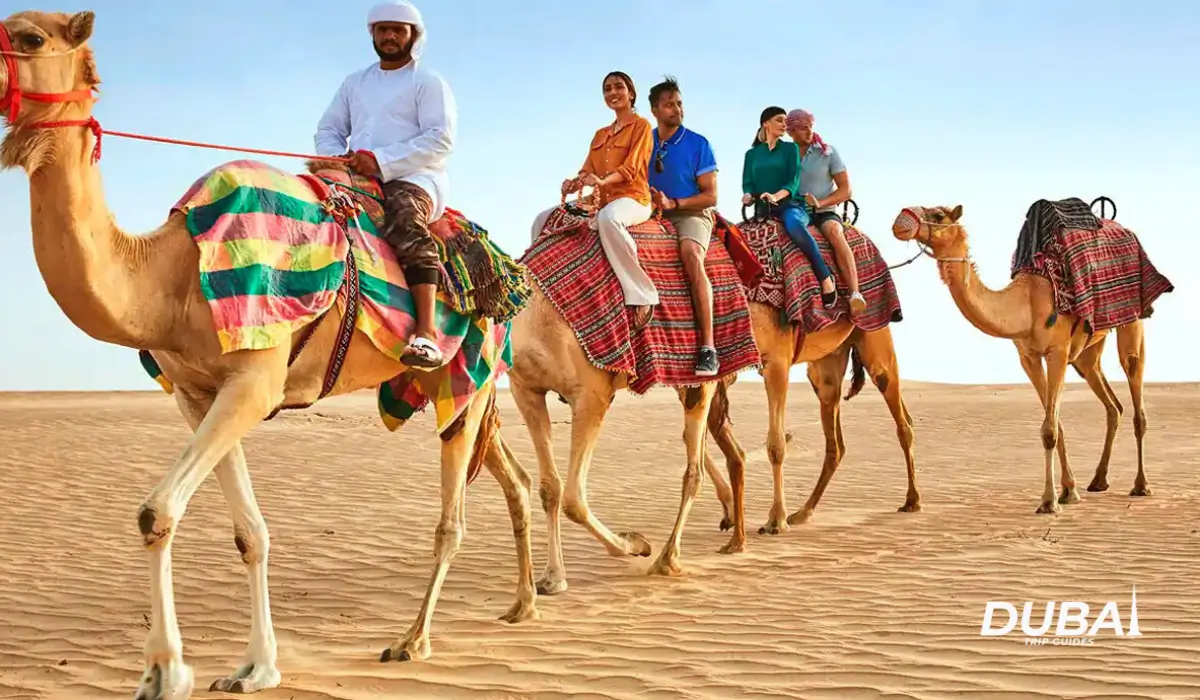
Islamic traditions shape Dubai’s identity and people. The city’s culture is influenced by Islam in its architecture, art, and daily life. Knowing Dubai’s culture means learning about Islam’s impact on Emirati society.
The Islamic faith guides Dubai’s people in life. It affects business, education, family, and social life. Mosques are not just for worship but also community centers for gatherings.
Islamic Influences on Emirati Identity
The Emirati identity is deeply rooted in Islamic traditions. Values like hospitality, respect, and generosity are key in Islam. These values are seen in Emiratis’ daily lives.
Traditional clothes, like the Kandura and Abaya, show Islamic modesty. Ramadan fasting and Eid celebrations unite the community. These events highlight Islamic values in Dubai’s social fabric.
The Pillars of Cultural Heritage
Dubai’s culture is supported by history, language, and traditions. Arabic is a key part of Emirati identity. Traditional dances and music help keep the culture alive.
Historical sites like Al Fahidi show Dubai’s past. Preserving these sites is crucial for Dubai’s cultural identity. It teaches future generations about their heritage.
In conclusion, Dubai’s culture is a vibrant mix of Islamic heritage and history. Its unique blend of tradition and modernity makes it a fascinating place for cultural exploration.
Language and Religion in Emirati Society
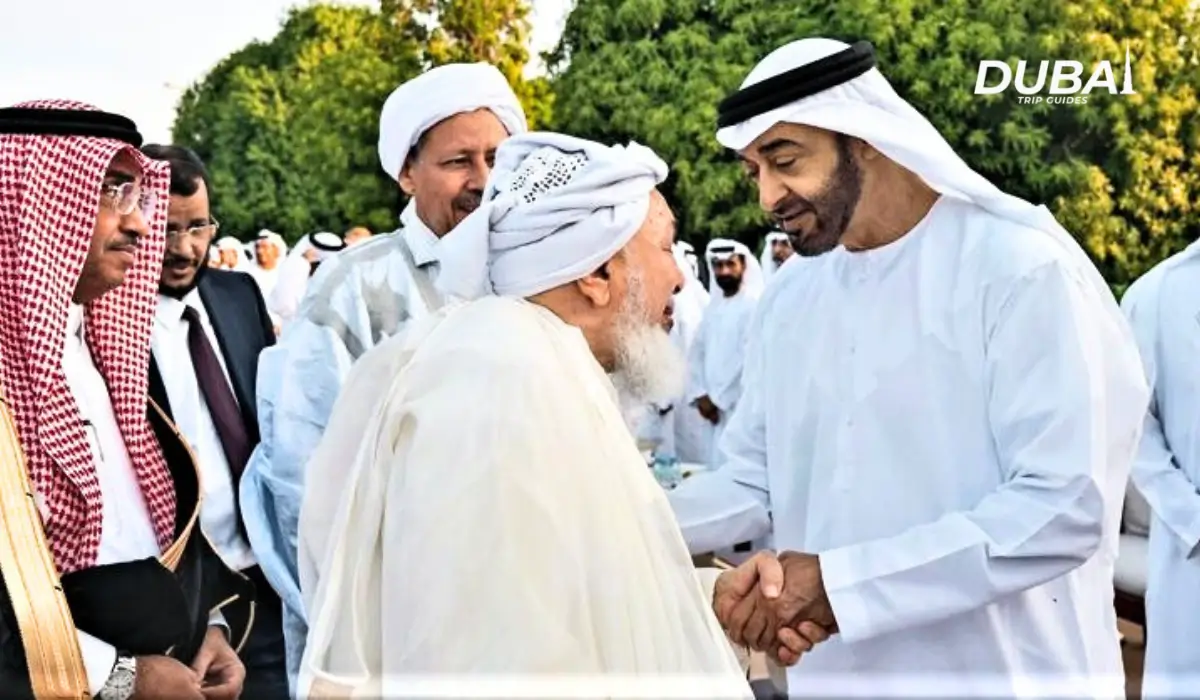
In the UAE, language and religion shape the Emirati identity. They deeply influence the country’s culture.
Arabic Dialects and Communication Styles
Arabic is the UAE’s official language. Its dialects show the country’s history and diversity. Arabic hospitality is famous for showing respect and warmth to guests.
In Emirati society, communication is both formal and informal. Formal Arabic is used in official places. But, everyday talks use colloquial dialects. The Majlis is key for discussing and bonding.
- Arabic dialects vary across different regions of the UAE.
- Formal Arabic is used in official and educational settings.
- Colloquial dialects are used in informal conversations and daily life.
Islam’s Role in Daily Life and Practices
Islam is the UAE’s official religion. It deeply influences Emirati daily life. Islamic values shape personal behavior and public policies. The Islamic influences on Dubai culture are seen in architecture and events.
The UAE’s Islamic heritage is shown in mosques and museums. Ramadan and Eid are important Islamic events.
“The UAE’s commitment to preserving its Islamic heritage is evident in its efforts to promote Islamic culture and values.”
- Islamic values guide personal and public behavior.
- The UAE’s Islamic heritage is preserved through its cultural institutions.
- Ramadan and Eid celebrations are significant Islamic events.
Traditional Attire and Personal Expression
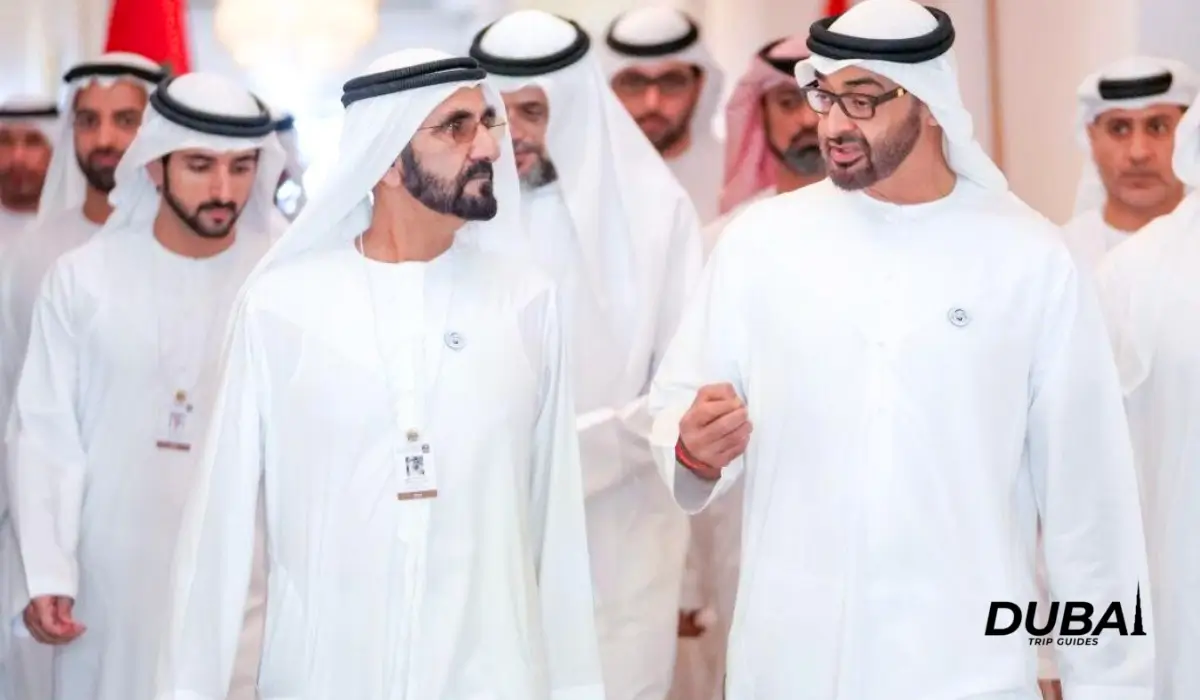
In Dubai, traditional clothes show the Emirati people’s values and history. Men and women’s outfits reflect the nation’s rich heritage and identity.
Men’s Traditional Dress: The Kandura and Accessories
Men in Dubai wear the Kandura, a long, white robe. It’s elegant and practical. The Kandura shows the wearer’s cultural roots.
Accessories like the Ghutra (headscarf) and Agal (headband) go with the Kandura. They make the outfit look dignified.
The Kandura’s design changes with the occasion. It’s simple and comfortable, showing modesty and humility.
Women’s Fashion: The Abaya, Sheila, and Modern Adaptations
Women in Dubai wear the Abaya, a flowing, black robe. The Sheila, a headscarf, covers the hair. The Abaya shows respect for local culture.
Modern Abayas have different designs and fabrics. They let women show their style while staying traditional.
The Abaya has changed over time. It now shows individuality while keeping its traditional essence.
Significance of Clothing in Cultural Identity
Traditional clothes in Dubai show the nation’s values and history. The Kandura and Abaya are symbols of Emirati identity. They reflect the community’s heritage.
| Traditional Attire | Description | Significance |
| Kandura | Long, white robe worn by men | Symbolizes modesty and cultural roots |
| Abaya | Flowing, black robe worn by women | Represents modesty and respect for local culture |
| Ghutra and Agal | Headscarf and headband worn by men | Adds to the dignified appearance of the Kandura |
| Sheila | Headscarf worn by women | Covers the hair as a sign of modesty |
A famous Emirati fashion designer said, “Traditional clothes connect the past and present. They honor our heritage and welcome modernity.”
“The traditional attire of Dubai is a testament to the city’s rich cultural heritage, reflecting the values and customs of the Emirati people.”
In conclusion, traditional clothes in Dubai are key to the city’s culture. The Kandura and Abaya show the nation’s history and values. They also let people express themselves within cultural traditions.
Festivals and Celebrations in the Emirates
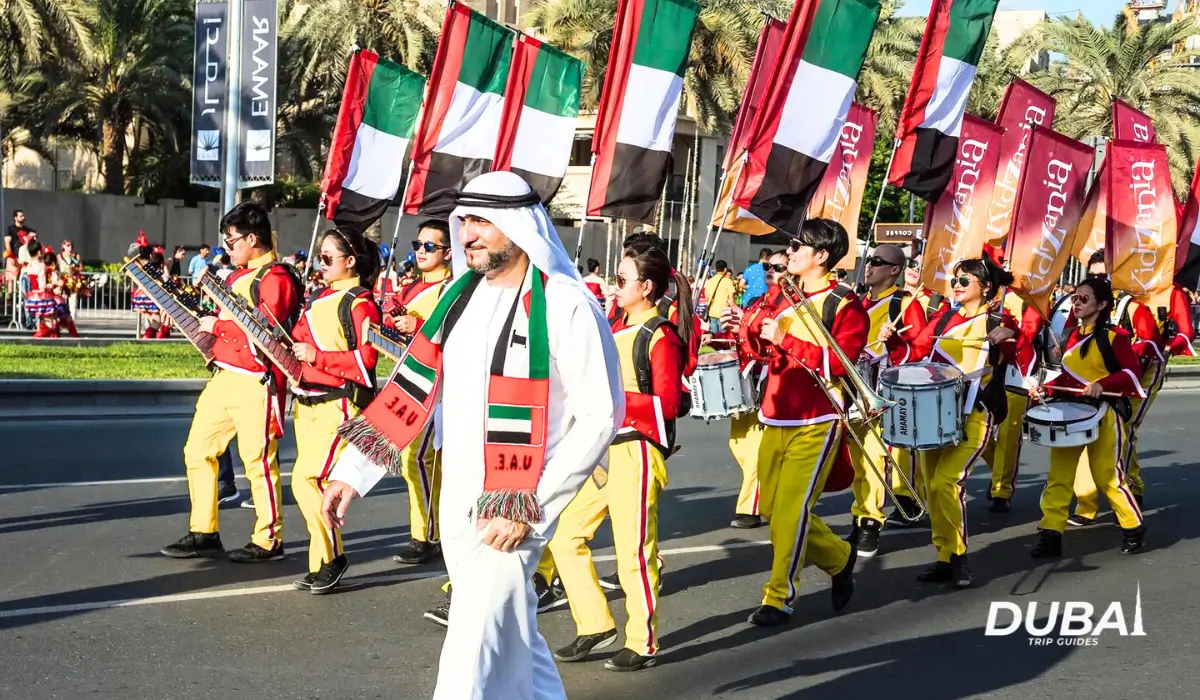
Dubai’s festivals show the city’s rich culture. The city’s calendar is filled with events. These events reflect its heritage and traditions.
Religious Observances: Ramadan and Eid Festivities
Ramadan is a big month in Dubai. It’s marked by fasting, reflection, and community gatherings. The city lights up with Ramadan customs like Iftar and Suhur.
Streets are lit up, and mosques host special Tarawih prayers. Eid celebrations in Dubai are grand and festive. Eid al-Fitr ends Ramadan, and Eid al-Adha honors the Prophet Ibrahim’s sacrifice.
Families share traditional meals, exchange gifts, and pray together.
| Festival | Description | Date |
| Ramadan | Month of fasting and reflection | Variable, based on lunar calendar |
| Eid al-Fitr | Celebration marking the end of Ramadan | 1st Shawwal |
| Eid al-Adha | Celebration honoring Prophet Ibrahim’s willingness to sacrifice | 10th Dhu al-Hijjah |
National Celebrations: UAE National Day and Patriotic Events
UAE National Day is on December 2nd. It’s a big national day tradition that celebrates the country’s unity. The day has patriotic events, fireworks, and cultural shows in Dubai.
People come together to celebrate the nation’s achievements and heritage.
Martyr’s Day on November 30th honors UAE nationals who have died in service.
Cultural Festivals and Modern Celebrations
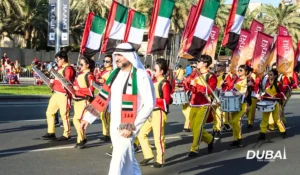
Dubai has many cultural festivals all year. The Dubai Cultural Festival is a highlight. It features traditional music, dance, and art.
Modern celebrations like the Dubai Shopping Festival and Dubai World Cup attract visitors. They blend entertainment with cultural experiences.
These festivals and celebrations show Dubai’s cultural identity. They make Dubai a vibrant and inclusive place for cultural enthusiasts and tourists.
Cultural Etiquette and Social Customs
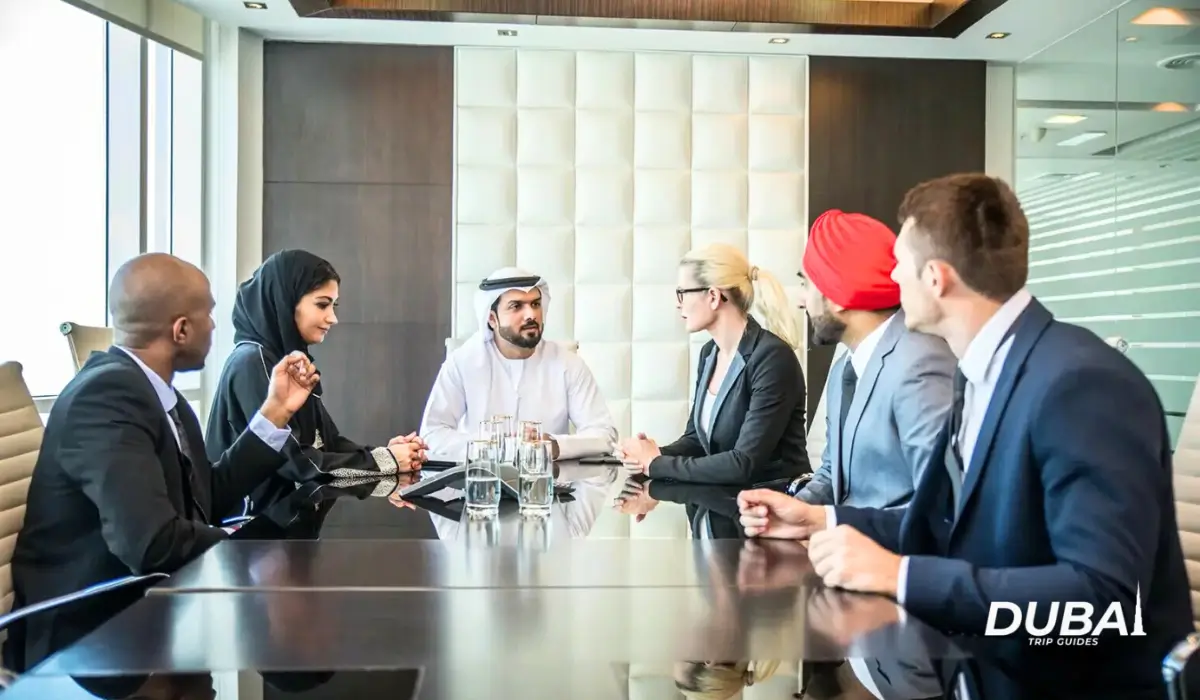
In Dubai, cultural rules and social norms are very important. They come from the city’s history and Islamic values. Knowing these customs helps everyone show respect and live in harmony.
The Art of Emirati Hospitality
Emirati hospitality is known for being warm and generous. It shows the values of respect and kindness to guests.
This tradition comes from Arabic hospitality. Guests are treated with great respect. They are offered traditional drinks like Gahwa (Arabic coffee) and dates. These gifts mean welcome and kindness.
Majlis Culture and Community Gatherings
Majlis culture in Dubai is key to Emirati social life. It’s a place for people to talk, share stories, and build friendships.
These meetings are friendly and open. They often include traditional games and talks about local news.
Social Interactions and Respectful Conduct
Being respectful is very important in Dubai’s diverse society. It’s important to know and follow local customs and rules.
For example, when you visit a mosque, you must follow mosque etiquette in Dubai. This means dressing modestly and taking off your shoes before entering.
| Cultural Aspect | Etiquette Tip |
| Greeting | Use the right hand when giving or receiving something. |
| Dress Code | Dress modestly, covering shoulders and knees. |
| Mosque Visit | Remove shoes and dress modestly. |
| Social Gatherings | Be respectful and engage in polite conversation. |
Traditional Emirati Cuisine and Dining Customs

The Emirates’ flavors show its Bedouin roots and cultural mix. Emirati food is known for its rich tastes and smells. It uses local items like dates, fish, and meat.
It’s more than just food. It’s a big part of the country’s culture and welcoming spirit.
Signature Dishes and Their Cultural Significance
Emirati food has many special dishes. These are key to the country’s culture and traditions. They’re served at big events and gatherings.
Food is very important in Emirati society.
Machboos, Harees, and Luqaimat
Machboos is a tasty rice dish with meat or fish and spices. Harees is slow-cooked wheat with meat, served at special times. Luqaimat are sweet dumplings loved during Ramadan.
Arabic Coffee (Gahwa) and Date Traditions
Arabic coffee, or Gahwa, is key to Emirati welcome. It’s given in small cups, showing kindness and respect. Dates are also big in Emirati culture, showing hospitality and warmth.
Culinary Influences and Regional Variations
Many cultures have shaped Emirati food, like Persian, Indian, and African. This mix is seen in the spices and ingredients used. Each emirate has its own dishes and ways of cooking.
The Evolution of Dubai’s Food Culture
Dubai’s food scene has changed a lot. Traditional dishes now mix with new tastes. Today, Dubai has many food options, from local to international.
But, traditional dishes are still a big part of Dubai’s culture.
Art and Architecture in Dubai’s Cultural Landscape
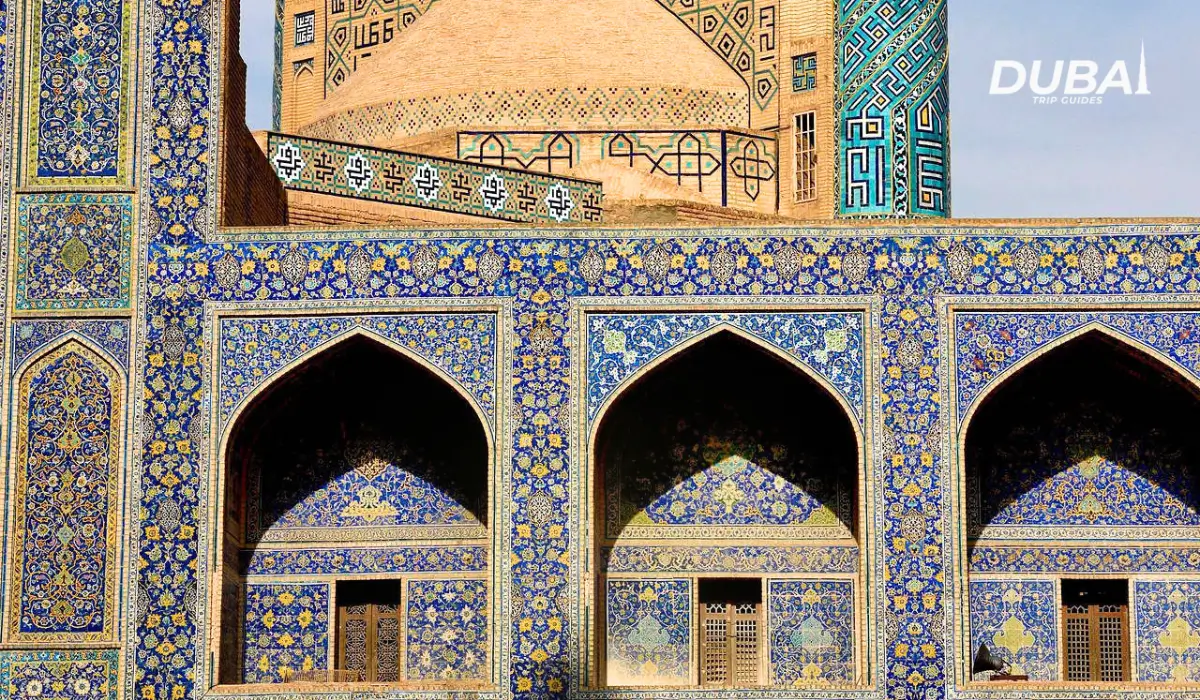
Art and architecture are key in Dubai’s story. They show its rich past and bright future. Dubai’s mix of old and new makes it unique.
Traditional Art Forms and Handicrafts
Dubai’s art shows its deep culture. Arabic calligraphy is a big part of this. It’s found in mosques and buildings, showing Islamic faith.
Handicrafts like weaving and pottery are also important. You can see them in souks, or markets. Souks are places where you can buy handmade things and see artisans work.
Music, Dance, and Performing Arts
Music and dance are big in Emirati culture. Traditional Emirati music and Dubai folklore dances are loved at celebrations. The Ardha dance is special, showing community spirit.
Dubai has many cultural events. They bring people together and keep traditions alive. These events are for everyone, locals and visitors.
Architectural Heritage and Modern Marvels
Dubai’s buildings show its old and new sides. The Al Fahidi Historical Neighbourhood takes you back in time. But, the Burj Khalifa and Museum of the Future look to the future.
Dubai’s buildings are more than pretty. They are made to serve a growing city while keeping its culture. This mix is what makes Dubai special.
Heritage Sports and Traditional Pastimes
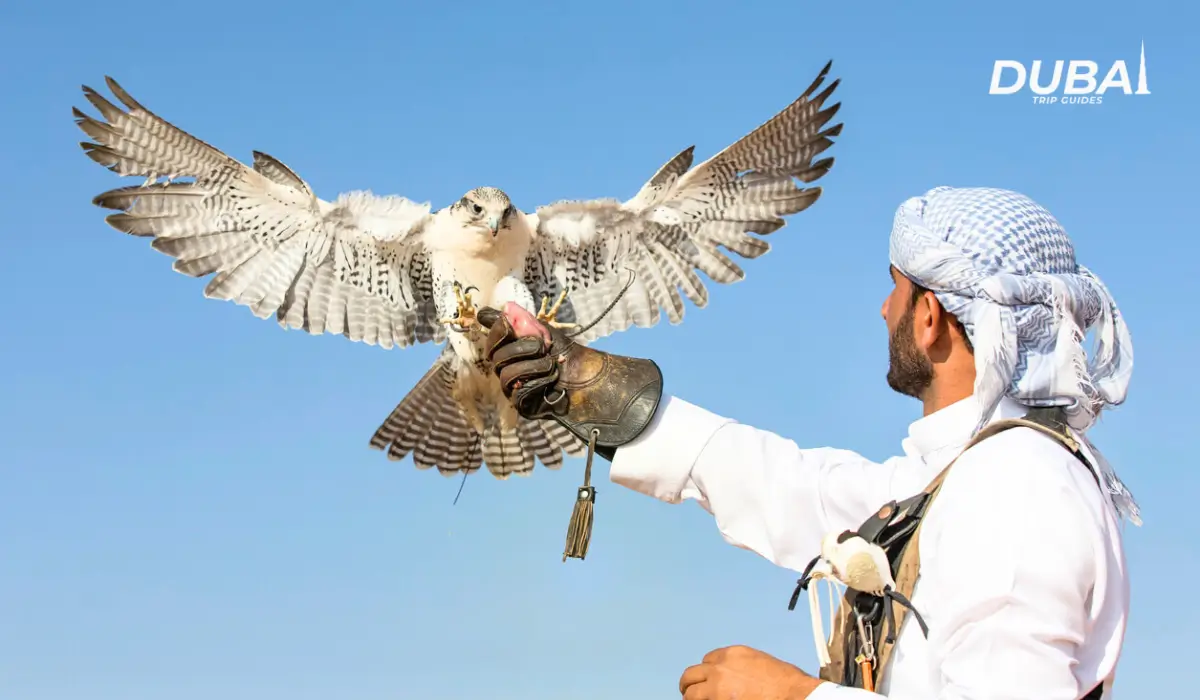
Dubai’s sports and pastimes show its rich culture and importance today. These activities reflect the city’s history and values. They have been passed down through generations.
Falconry: The Ancient Art of the Desert
Falconry, or Al-Bayzara in Arabic, is an old sport in the UAE. It shows the Bedouin people’s bond with nature and their cleverness in the desert. Falconry means training falcons to catch prey, a skill important for survival.
Falconry is more than hunting. It’s a cultural practice that teaches patience, respect for nature, and understanding of the desert. Today, Dubai celebrates falconry with competitions like the Dubai International Falconry Championship. This event draws fans from all over.
“Falconry is not just a sport; it’s a way of life that connects us to our heritage and the natural world.”
Camel Racing and Its Cultural Significance
Camel racing is a long-standing sport in Dubai. It shows the speed and strength of camels, bred for racing. This sport is part of Emirati culture, showing hospitality, generosity, and community.
Now, camel racing uses robotic jockeys instead of children. This change makes the sport safer. The Dubai Camel Racing Championship is a big event that shows the sport’s importance and how it’s kept alive with new technology.
| Traditional Sport | Cultural Significance | Modern Adaptation |
| Falconry | Symbolizes connection with nature and resourcefulness | Falconry competitions and events |
| Camel Racing | Represents hospitality, generosity, and community | Use of robotic jockeys for safety |
| Pearl Diving | Historically crucial for the economy and cultural identity | Preserved through museums and cultural exhibitions |
Pearl Diving and Maritime Heritage
Pearl diving was key to Dubai’s economy. The city’s location made it a center for pearl trading. Divers bravely harvested pearls from the sea.
Even though pearl diving declined with oil discovery, Dubai still celebrates its maritime heritage. Museums, exhibitions, and reenactments keep this history alive. They honor those who helped Dubai prosper.
Adventure and tourism help keep these heritage sports alive. Visitors to Dubai can try these activities and learn about the city’s culture. They can watch camel racing, learn about falconry, or explore pearl diving history. This way, tourists connect with Dubai’s true traditions.
Family Values and Social Structure
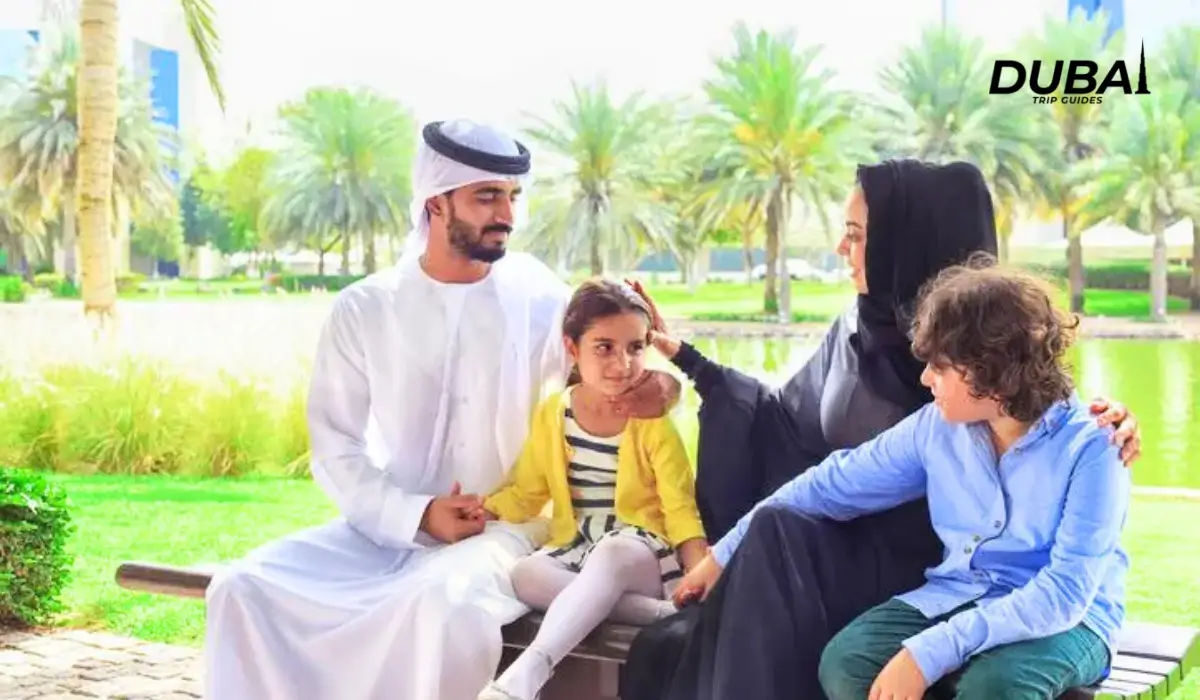
Family is very important in Emirati culture. It shapes life in the United Arab Emirates. Family ties and respect for elders are key.
The Centrality of Family in Emirati Society
In Emirati society, family is more than just a group. It’s the base of the community. Islamic values and Bedouin traditions make family loyalty and support very important.
“The family is the first school in which the individual is educated, and it is the most important institution in shaping the personality of the individual.” This shows how family shapes who we are and society’s norms.
Family is central in many parts of Emirati life. It’s key in social gatherings and business. Family ties help decide social standing.
| Aspect of Life | Traditional Family Influence | Modern Adaptations |
| Social Gatherings | Family-centric, with a strong emphasis on hospitality | Incorporating modern entertainment while maintaining family values |
| Business Dealings | Family businesses and tribal affiliations playing a significant role | Diversification of economy and emergence of non-family businesses |
| Education | Emphasis on Islamic education and traditional values | Incorporation of modern curriculum and international education |
Traditional Roles and Modern Adaptations
Traditional roles in Emirati families follow Islamic principles and cultural heritage. Men are usually providers, and women manage the home and raise kids. But, modern changes are making these roles shift.
Women are now in the workforce more, and men help with home duties. This change is seen in the younger generation. They want to mix old and new ways of living.
“The empowerment of women is a crucial aspect of the UAE’s development strategy, recognizing the important role women play in the country’s progress.”
— Sheikh Mohammed bin Rashid Al Maktoum, Vice President and Prime Minister of the UAE
As Emirati society grows, finding a balance between old values and new ways is key. This balance is important for its social structure.
The Influence of Tradition on Modern Enterprises
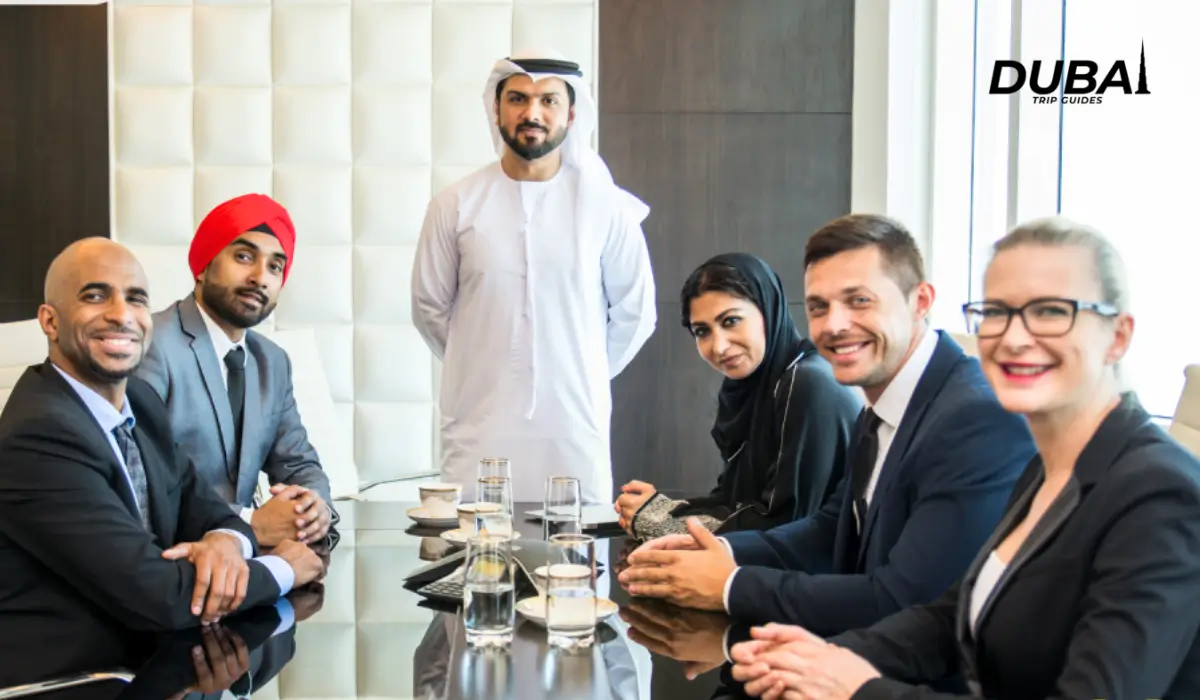
Dubai shows how to mix old traditions with new ideas. It’s a global business center that keeps its cultural roots alive. This makes Dubai’s business world both modern and traditional.
Businesses in Dubai follow old values in their daily work. This is seen in how they do business and treat each other. Sheikh Mohammed bin Rashid Al Maktoum said,
“The future does not erase the past; it builds upon it.”
This idea guides Dubai’s business world. It values tradition and looks to the future at the same time.
Business Etiquette with Cultural Foundations
In Dubai, business manners come from culture and Islam. The idea of wajh, or “face,” is key. It means keeping dignity and respect in business talks.
Starting meetings with “As-salamu alaykum” (peace be upon you) is common. It’s a way to show respect before talking business. This might seem old-fashioned, but it’s important for building strong business ties.
Traditional Values in Contemporary Commerce
Dubai’s success comes from mixing old values with new business ways. For example, Shura, or talking things over, helps make decisions. This old way of making choices helps businesses work together better.
Family and community are big in Emirati culture. This has led to many family businesses in Dubai. These businesses focus on lasting success, not just quick wins.
In short, Dubai’s mix of tradition and modernity makes it a top business place. It keeps its cultural roots while moving forward. This makes Dubai’s business scene both new and deeply rooted in history.
Cultural Tourism: Experiencing Dubai’s Heritage
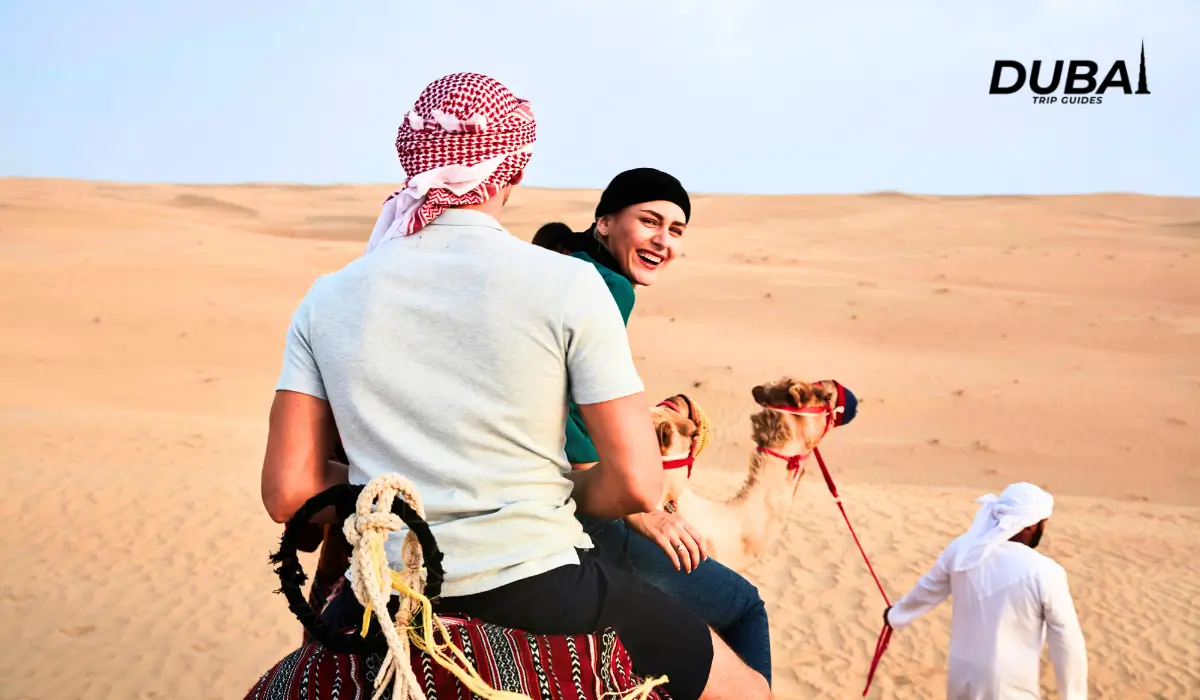
Dubai is a mix of old traditions and new ways. It offers a special cultural tourism experience. Visitors can dive into the city’s rich history by visiting heritage spots and trying local customs.
Heritage Districts and Cultural Sites
Dubai’s heritage areas, like Al Fahidi Historical Neighbourhood and Deira Old Souk, show the city’s past. These places have old buildings, museums, and cultural shows. They tell the story of Dubai’s history and culture.
- Al Fahidi Historical Neighbourhood: This area has many museums, cultural shows, and traditional Arabian houses.
- Deira Old Souk: A busy market where you can find traditional items, souvenirs, and local food.
Cultural Experiences for Visitors
Dubai has many cultural experiences for visitors. These let you connect with Emirati traditions. Here are some:
- Traditional Arabic Cuisine: Try local foods like machboos, luqaimat, and shawarma at traditional restaurants.
- Cultural Festivals: Dubai has cultural festivals all year. They celebrate its heritage and traditions.
- Desert Safaris: A fun activity that lets you see the desert and learn about Bedouin culture.
Authentic Encounters with Emirati Traditions
To really get Dubai’s culture, talk to locals and try traditional activities. Here are some ways:
- Visiting a traditional Majlis: A Majlis is where locals meet to chat and talk about things.
- Attending a cultural performance: Dubai has cultural shows, like dance and music.
- Trying local handicrafts: Learn about Emirati crafts like weaving, pottery, and metalwork.
By trying these cultural experiences, visitors can understand Dubai’s heritage and traditions better.
The Fusion of Tradition and Modernity

Dubai mixes old traditions with new ideas. This mix is not by chance. It’s a plan to keep the city’s roots alive while looking to the future.
The city’s cultural identity comes from its history and customs. Dubai grows fast, but it keeps its old ways alive. It does this by understanding how to hold onto its past while moving forward.
Preserving Cultural Identity in a Global City
Keeping cultural identity in Dubai is complex. The city has started many projects to save its heritage. These include:
- Creating cultural museums and heritage sites
- Supporting traditional arts and crafts
- Hosting cultural events and festivals
These steps keep Dubai connected to its past. For example, the Al Fahidi Historical Neighbourhood shows what Dubai was like before. It has old buildings and ways of life.
Innovation Rooted in Heritage
In Dubai, innovation comes from its rich history. This is seen in many areas, like:
- Architecture, where old Islamic designs meet new buildings
- Cultural tourism, letting visitors see Emirati traditions
- Business, where old values like hospitality meet new ideas
By mixing old and new, Dubai is special. It’s a place that looks to the future but values its past. This makes Dubai a great place for visitors, businesses, and innovators.
The Enduring Strength of Dubai’s Cultural Legacy
Dubai’s culture shows how to keep heritage alive while moving forward. The UAE’s culture and traditions are strong. They are based on the country’s history and Islamic values.
Dubai works hard to keep its heritage safe. It keeps traditional practices alive. The city’s architecture and festivals show its rich heritage.
Dubai’s culture is a mix of old and new. This makes it special and relevant worldwide. It keeps Dubai’s roots alive while looking to the future.
FAQ
What is the significance of traditional Emirati clothing?
Traditional Emirati clothing shows the culture and heritage of the people. Men wear the kandura, a long white robe. It shows respect and tradition. Women wear the abaya, a black robe that covers the body. It shows elegance and modesty.
How does Dubai preserve its cultural roots amidst modernization?
Dubai keeps its culture alive through many ways. It saves historical sites and holds cultural festivals. It also teaches the young about their heritage.
What are some traditional Emirati dishes and their cultural significance?
Traditional dishes like machboos, harees, and luqaimat are important in Emirati culture. Machboos is a rice dish with meat or fish. Harees is slow-cooked wheat, often eaten during Ramadan. Luqaimat are sweet dumplings for Eid celebrations.
What is the role of Islam in shaping Emirati identity?
Islam is very important in Emirati identity. It influences daily life and cultural traditions. The Islamic faith is deeply rooted in Emirati society.
How does Dubai balance tradition with modernity?
Dubai combines tradition and modernity well. It values innovation but also keeps its cultural heritage. This creates a unique mix of old and new.
What are some cultural experiences that visitors can have in Dubai?
Visitors can dive into Dubai’s culture by visiting heritage sites and festivals. They can try traditional activities like henna, Arabic coffee, and camel rides. This gives them a real taste of Emirati traditions.
What is the significance of majlis culture in Emirati society?
Majlis culture is key in Emirati society. It’s a place for socializing, discussing, and building relationships. The majlis shows hospitality and respect for guests, showing the values of Emirati culture.
How has Dubai's cultural landscape been influenced by its history and traditions?
Dubai’s culture is shaped by its history and traditions. It has been influenced by its Bedouin heritage, Islamic faith, and maritime trade. Today, many traditional practices and customs are still observed.

